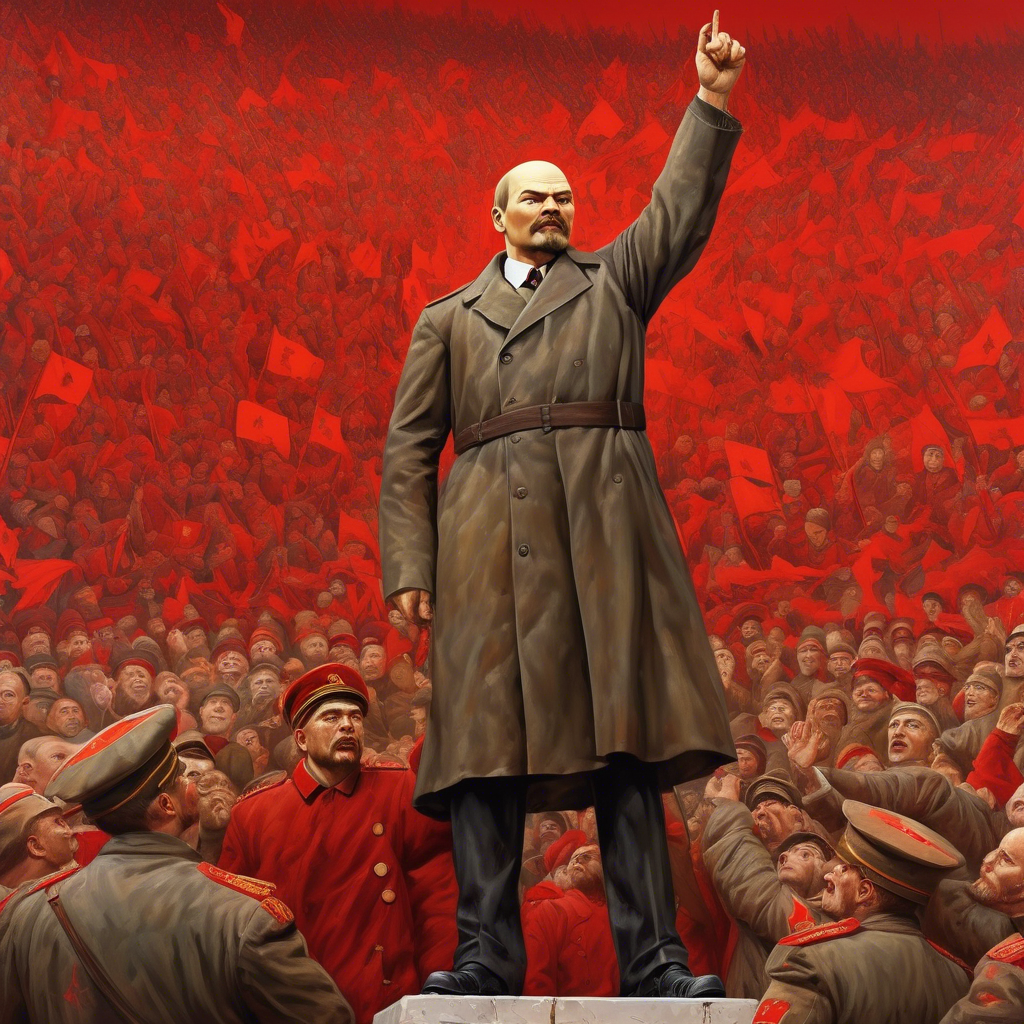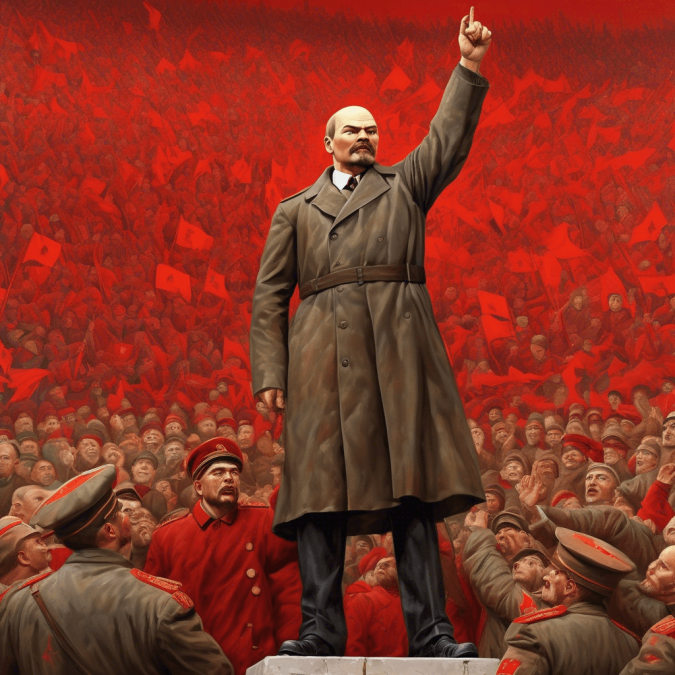
1. Introduction
Brief Overview of the Life of Vladimir Lenin
Vladimir Ilyich Ulyanov, famously known as Lenin, was a prominent revolutionary leader who played a pivotal role in shaping the course of world history. Born on April 22, 1870, in Simbirsk, Russia, Lenin emerged as a key figure in the Russian Revolution of 1917. His revolutionary zeal and unwavering commitment to socialist ideals distinguished him as a formidable force in the tumultuous political landscape of early 20th-century Russia.
Importance of His Contributions to World History
Lenin’s contributions to world history are profound and enduring. He championed the cause of the proletariat and advocated for the establishment of a socialist society based on the principles of equality and justice. Lenin’s revolutionary theories, encapsulated in his seminal works such as “What Is to Be Done?” and “State and Revolution,” continue to influence political movements and ideologies across the globe. His leadership during the Russian Revolution laid the foundation for the establishment of the Soviet Union, marking a significant turning point in the history of the 20th century.
2. Family Background
Origins of the Ulyanov Family
The Vladimir Lenin family traced its roots to the rural province of Astrakhan, where Lenin’s ancestors were serfs bound by the oppressive feudal system. The family’s journey from serfdom to intellectual prominence symbolized the social mobility and resilience that characterized Lenin’s upbringing.
Parents and Siblings of Vladimir Lenin
Vladimir Lenin father, Ilya Nikolayevich Ulyanov, was a school inspector and a staunch advocate of education and social reform. His mother, Maria Alexandrovna Ulyanova, instilled in him a deep sense of compassion and empathy for the plight of the working class. Lenin’s siblings, including his older brother Alexander Ulyanov, who was executed for his involvement in a plot to assassinate Tsar Alexander III, shaped his early political consciousness and commitment to revolutionary ideals.
Early Influences on Lenin’s Political Beliefs
Lenin’s formative years were marked by exposure to radical political ideas and fervent discussions on social justice and inequality. Influenced by the writings of Karl Marx and Friedrich Engels, Lenin embraced socialist principles and became increasingly disillusioned with the oppressive Tsarist regime. His early experiences laid the groundwork for his future role as a revolutionary leader and visionary thinker.
3. Education and Early Life
Lenin’s Education and Academic Achievements
Lenin excelled academically and demonstrated a keen intellect from a young age. He pursued higher education at Kazan Federal University, where he immersed himself in the study of law and philosophy. Lenin’s academic pursuits provided him with a comprehensive understanding of political theory and revolutionary tactics, laying the groundwork for his future leadership in the socialist movement.
Radicalization and Political Activism in His Youth
Lenin’s political awakening occurred during his youth, as he witnessed firsthand the injustices and inequalities perpetuated by the Tsarist autocracy. Inspired by the revolutionary fervor sweeping across Russia, Lenin embraced socialist ideals and actively participated in underground political activities aimed at challenging the oppressive regime. His early activism marked the beginning of a lifelong commitment to the struggle for social and economic justice.
Exile to Siberia for Revolutionary Activities
Lenin’s involvement in revolutionary activities eventually led to his exile to Siberia in 1897. Despite the harsh conditions and isolation, Lenin remained steadfast in his dedication to the revolutionary cause. His time in exile further solidified his resolve to overthrow the Tsarist regime and establish a socialist state based on the principles of Marxism.
4. Rise to Power
Formation of the Russian Social Democratic Labour Party
Upon his return from exile, Lenin played a pivotal role in the formation of the Russian Social Democratic Labour Party (RSDLP) in 1898. As a leading figure within the party, Lenin advocated for a revolutionary approach to achieving socialist goals and sought to unite various factions under a common revolutionary platform.
Leadership Role in the Bolshevik Faction
Lenin’s leadership within the Bolshevik faction of the RSDLP solidified his position as a prominent revolutionary figure. His unwavering commitment to revolutionary principles and his strategic acumen set him apart as a visionary leader capable of guiding the party toward achieving its revolutionary objectives.
Role in the 1917 Russian Revolution and Overthrow of the Tsarist Regime
The culmination of Lenin’s revolutionary efforts came in 1917 during the February and October Revolutions. Lenin played a central role in orchestrating the Bolshevik seizure of power in October, which led to the overthrow of the Provisional Government and the establishment of Soviet rule. Lenin’s decisive leadership and revolutionary zeal were instrumental in shaping the course of the Russian Revolution and paving the way for the establishment of a socialist state.
5. Establishment of Soviet Union
Lenin’s Role as Leader of the Soviet Government
Following the success of the Bolshevik Revolution, Lenin assumed leadership of the newly formed Soviet government. As Chairman of the Council of People’s Commissars, Lenin spearheaded the implementation of socialist policies and the consolidation of power. Lenin’s leadership style was characterized by decisiveness and pragmatism, as he navigated the challenges of transitioning Russia into a socialist state amidst internal and external threats.
Implementation of Socialist Policies and Reforms
Under Lenin’s leadership, the Soviet government implemented a series of radical socialist policies aimed at transforming the country’s political, economic, and social structures. Land was redistributed to the peasants, industry was nationalized, and workers’ rights were enshrined in law. Lenin’s vision of a classless society based on the principles of socialism guided the implementation of these transformative reforms.
Civil War and Consolidation of Power
The establishment of the Soviet Union was met with fierce resistance from counter-revolutionary forces and foreign intervention during the Russian Civil War. Lenin’s leadership during this tumultuous period was instrumental in securing the Bolsheviks’ hold on power and ultimately emerging victorious. The civil war tested the resilience of the young Soviet state, but Lenin’s strategic acumen and unwavering commitment to the socialist cause ensured the survival of the revolution.
6. Death and Legacy
Lenin’s Declining Health and Eventual Death
In the waning years of his life, Lenin’s health deteriorated due to a series of strokes. His declining physical condition forced him to withdraw from active leadership, leading to a power struggle within the Communist Party. On January 21, 1924, Lenin passed away, leaving behind a legacy that would shape the course of world history for decades to come.
Impact of Lenin’s Ideas and Leadership on the World
Lenin’s ideas and leadership had a profound impact on the world, inspiring revolutionary movements and socialist experiments across the globe. His emphasis on the vanguard role of the proletariat, the necessity of armed insurrection, and the establishment of a socialist state influenced revolutionary struggles in countries such as China, Cuba, and Vietnam. Lenin’s legacy as a revolutionary theorist and statesman continues to resonate in the annals of history.
Assessment of Lenin’s Legacy in Modern Times
In modern times, Lenin’s legacy remains a subject of debate and controversy. While some view him as a visionary leader who laid the groundwork for socialist transformation, others criticize his authoritarian methods and the repressive nature of the Soviet regime. The legacy of Lenin continues to provoke discussions on the nature of revolution, the role of the state, and the pursuit of social justice in contemporary society.
7. Conclusion
Summary of Key Points in Lenin’s Biography
Vladimir Lenin’s life was characterized by a relentless pursuit of revolutionary change and a steadfast commitment to socialist ideals. From his early years as a radical activist to his leadership role in the Bolshevik Revolution and the establishment of the Soviet Union, Lenin’s impact on world history is undeniable. His intellectual rigor, strategic acumen, and unwavering dedication to the cause of the proletariat set him apart as a towering figure in the annals of revolutionary history.
Reflection on His Lasting Influence on World History
Lenin’s lasting influence on world history transcends the boundaries of time and geography. His revolutionary theories and leadership legacy continue to inspire political movements and ideological struggles around the globe. The establishment of the Soviet Union under Lenin’s guidance marked a significant chapter in the history of socialism and revolution, shaping the course of 20th-century geopolitics and socio-economic development.
In conclusion, Vladimir Lenin’s contributions to world history as a revolutionary leader, statesman, and socialist thinker are indelible. His legacy serves as a testament to the enduring power of ideas and the transformative potential of grassroots movements in shaping the future of societies. As we reflect on Lenin’s life and legacy, we are reminded of the profound impact that visionary leaders can have on the course of history and the quest for a more just and equitable world.
Through his unwavering commitment to social justice, his revolutionary zeal, and his enduring legacy, Vladimir Lenin remains a towering figure in the pantheon of revolutionary leaders whose influence reverberates through the corridors of history.
